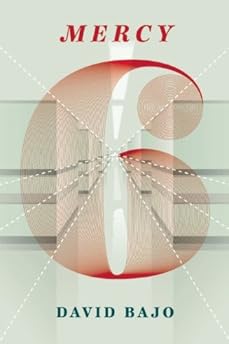« older | Main Largehearted Boy Page | newer »
September 19, 2014
Book Notes - David Bajo "Mercy 6"
In the Book Notes series, authors create and discuss a music playlist that relates in some way to their recently published book.
Previous contributors include Bret Easton Ellis, Kate Christensen, Kevin Brockmeier, George Pelecanos, Dana Spiotta, Amy Bloom, Aimee Bender, Myla Goldberg, Heidi Julavits, Hari Kunzru, and many others.
David Bajo's novel Mercy 6 is an ambitiously told literary thriller.
Foreword Reviews wrote of the book:
"The complex, nuanced story will appeal to those interested in deciphering the events and attaching their own meaning rather than being provided straightforward answers. The events are a metaphor that can be interpreted in many ways, about containing information, and about the consequences of stifling and suppressing new ideas."
Stream a playlist of these songs at Spotify.
In his own words, here is David Bajo's Book Notes music playlist for his novel Mercy 6:
My Mercy 6 protagonist, Anna Mendenhall, has the most realistic view of Los Angeles anyone could possibly achieve. She's an ER doctor in one of the city's main hospitals. She pulls twelve hour shifts that usually stretch toward twenty-four. In the eleventh hour she can receive and treat an overdose, a bullet wound, a broken wrist, and a fishhook removal. There's very little backstory in Mercy 6 because there's no time for it. All of the world-building in the story forms in the tiny interludes during Mendenhall's quest to diagnose the contagion while battling protocol. In these little seeps, she thinks about music—at least I imagine she does. Once, she actually thinks of a song. Other times, I think of a song for her. Here is her playlist.
"I Want to See the Bright Lights Tonight," by Richard and Linda Thompson
The song is wishful thinking, about our impossible to desire to toss aside responsibility, get wasted, fight, love. A couple of drunken nights rolling on the floor, is just the kind of mess I'm looking for. This sentiment passes through Mendenhall often. The only way to endure a job—whether we love it or hate it—is to imagine its end. This song is about the want rather than the bright lights. Linda Thompson's vocal perfectly evokes that.
"L.A.," by Neil Young
Mendenhall sees and treats the real Los Angeles. She has grown to despise the Hollywood version that dominates song, television, film, travelogue, and literature. She has even grown to despise cultural works about the delusion of the Hollywood version. This is the one song she briefly conjures as she hurries onto the sidewalks, an escapee from lockdown and quarantine. Young's song doesn't stop at the delusion. It taunts us with the delusion, tells us we still want it anyway. Don't you wish you could be here, too? Don't you wish you could be here, too?
"Cortez the Killer," by Neil Young
Mendenhall names her dog after this song. Cortez has to live with her aunt because Mendenhall's hardly ever home from the ER. He's a scruffy little terrier mix, no bigger than a loaf of bread, Cortez the Killer.
"Los Angeles," by X
Most of their music, tonally and lyrically, offers the real L.A. that nobody really knows, the city that Mendenhall sees everyday in the ER bay. I imagine she takes it with her during the escape and rescue part of the story. X is about as far away from Santa Monica as you can get without leaving Los Angeles.
"Desperados Under the Eaves," by Warren Zevon
This completes the Young-X-Zevon Los Angeles triad. As California slides into the ocean, like the mystics and statistics say it will.
"Speigel im Speigel," by Arvo Pärt
There are moments in this plot-driven novel where Mendenhall is suspended, once in water, a few more in dark passages within the Mercy General infrastructure. In these moments, she has used her expertise to its full extent while she must wait for and trust the expertise of others. What we all have to do, if we're doing it right.
"Basstrap," by Overseer
Mendenhall disdains metaphor. She believes people, especially doctors and scientists, use metaphor to cover gaps in their knowledge. I don't quite share her disdain, but I am suspicious of metaphor in my own writing. Mendenhall and I relate to this song, how it directly translates pressure into music and then quantifies it in words.
David Bajo and Mercy 6 links:
the author's website
excerpt from the book
Examiner.com interview with the author
Fiction Writers Review interview with the author
Free Times profile of the author
Largehearted Boy Book Notes entry by the author for Panopticon
The State profile of the author
also at Largehearted Boy:
Book Notes (2012 - ) (authors create music playlists for their book)
Book Notes (2005 - 2011) (authors create music playlists for their book)
my 11 favorite Book Notes playlist essays
100 Online Sources for Free and Legal Music Downloads
Antiheroines (interviews with up and coming female comics artists)
Atomic Books Comics Preview (weekly comics highlights)
Daily Downloads (free and legal daily mp3 downloads)
guest book reviews
Largehearted Word (weekly new book highlights)
musician/author interviews
Note Books (musicians discuss literature)
Short Cuts (writers pair a song with their short story or essay)
Shorties (daily music, literature, and pop culture links)
Soundtracked (composers and directors discuss their film's soundtracks)
weekly music release lists






